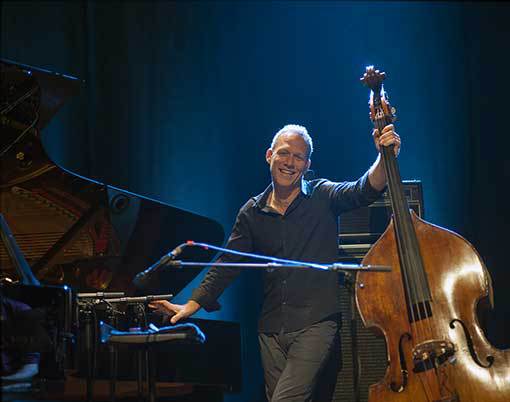The Israeli composer and double bassist Avishai Cohen is one of the jazz world's most popular musicians of today. He has stopped in the Czech Republic several times, twice at the JazzFestBrno and most recently at this year's Colours of Ostrava. At the end of November, he will perform in Brno again, but this time it is an exceptional event. The concert is part of Cohen's first tour with the symphony orchestra, so in addition to the usual trio the Brno Philharmonic will also be on the stage in Bobycentrum. Before the Brno performance, we managed to get a few modest answers to several immodest questions from Avishai Cohen.
Why did you decide to perform with a symphony orchestra, whose idea was it?
I thought about it for many years, my manager liked the idea and helped the entire project come to life. Basically, the point is that I love classical music and it is a big challenge for me to try to link it to my own music.
Is it your first symphonic experience?
It is the first time with my own music.
Did you write any new compositions for this ensemble, who is the author of arrangements?
I composed a few new pieces but we will play a lot of older pieces. They were adjusted for the orchestra by the American conductor, arranger and producer Robert Sadin – all the orchestration is his work.
What is the biggest difference for you between a symphony orchestra and a jazz big band – except for the specific sound, of course?
It is primarily the rhythmic feeling. The symphony orchestra does not have such a strong and aggressive staccato, it is not so succinct in the rhythmic expression. It is a completely different way of playing, different phrasing that does not stress syncopes. Simply a different instrument for which melodic expression is characteristic.
An important turning point in your career was in 2003 when you left the band of Chick Corea. Do you think that your symphony project will result in a similar break?
Nothing is ever quite the same, at least I have changed a lot since then. This experience will be important at least for me and then we'll see.
Two years ago, I performed with a chamber ensemble – it was a modified string quartet and oboe. Was it your plan already then to extend it to a whole orchestra?
It was certainly the beginning of this journey, the starting point. I was able to bounce from it to today's situation which means clear progress for me.
In the quartet, you replaced the second violin with the viola. Are there any changes in the orchestra as well – perhaps again violas instead of violins or saxophones instead of clarinets?
Definitely not. The chamber orchestra seemed interesting to me and I needed to get a different, deeper sound that would go better together with my songs and their arrangements. However, in my opinion, the symphony orchestra does not need that, so we use it with the standard arrangement.
What is the most important thing for you as part of the capacities of the orchestration: powerful sound, new sound colours, the ability to use a more complex musical structure?
The most important thing is always to make sure that the result has a beautiful sound so that it is beautiful music. It does not have to be too complicated and the sound too powerful. Eventually, a feeling of strength and health must always come from the stage. The orchestra offers the opportunity to multiply and express these feelings in their entirety.
Is there any room for improvisation in the new arrangements?
Surely, improvisation is necessary for me and we left space for individual members of the trio and for everyone together. It is an integral part of our performance.
Are there any sections where it is not you, who is improvising, but the members of the orchestra?
No, nothing like that will happen, I do not even know how good the orchestral players are in this sense, whether they know how to do it. So we are not planning on that.
Is the orchestra an equal partner for your trio or are they just accompanying you?
Our intention was not to create an accompaniment to the trio, but orchestral sound. That was the main idea so we really cannot talk about equality but about a joint and new final expression.
Do you feel more like a musical innovator, or is tradition the necessary basis for you?
Tradition can never be neglected, even though it is not necessary to come back to it specifically. It is in the fundamentals of all my musical abilities and skills, and not just musical ones. Tradition is everything: language, behaviour, habits – it is not necessary to think about it specifically. And the best jazz tradition is not to play traditionally.
How long is your symphonic tour and how many concerts are there?
This year, there will be only four performances. The main part of the tour comes in 2016 and 2017 when we fully roll out the project.
































No comment added yet..